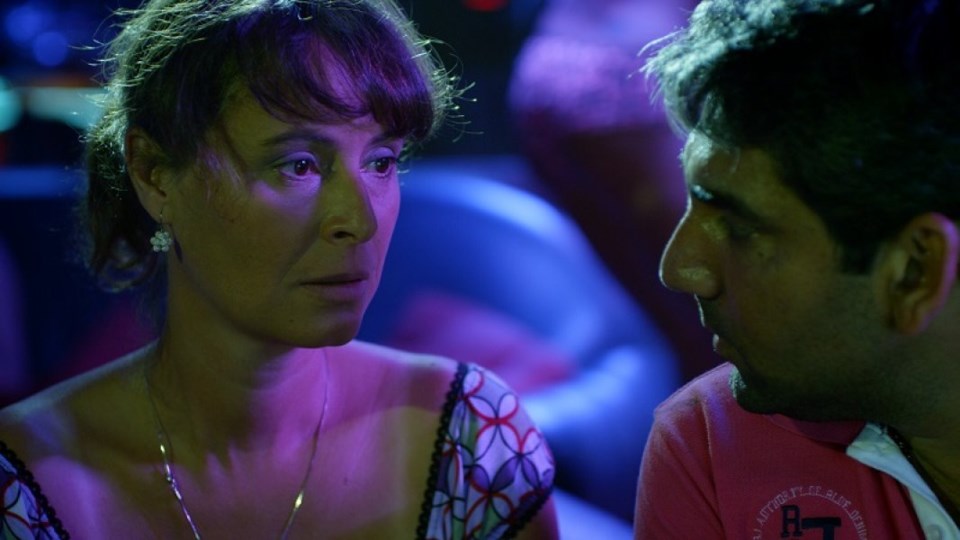The Toronto International Film Festival is the place to get a first peek at all those Oscar-nominee-would-be’s, but it’s also a haven for the best the rest of the world has on offer. There’s a staggering variety of world cinema at this year’s TIFF, which runs until Sept. 18, with 296 feature films and 101 shorts from 83 countries.
Here’s a teaser list of some of the films you won’t see at your multiplex but that are well worth chasing down.
We Are Never Alone (Czech Replublic/France)
Czech director Petr Vaclav takes a census, of sorts, among the residents of a bleak Eastern European town. There’s a hypochondriacal husband (Karel Roden) and his wife (Lenka Vlasakova), stretched to the breaking point by two kids and her husband’s madness. A lovesick brothel bouncer (Zdenek Godla) tries vainly to win prostitute Sylva’s (Klaudia Dudova) affection. A prison guard (Miroslav Hanus) finds ominous offerings on his doorstep almost daily, locks his family in their rooms at night, and talks with nostalgia about the Soviet occupation. The children are the overlooked victims here; Vaclav makes that clear by film’s end. The director’s humour is dark indeed (a condom used to prevent throat cancer?) but he tells his characters’ sad stories with tenderness and insight. Â
The Happiest Day in the Life of Olli Maki(Finland/Germany/Sweden)
Juho Kuosmanen’s film won the Cannes Un Certain Regard this year and was just named as Finland’s foreign-language Academy Award entry. The black-and-white period drama is set during the run-up to the August 1962 featherweight bout between Finnish hopeful Olli Maki (Jarrko Lahti) and the American title-holder Davey Moore. The camera is an observer — getting jostled in crowds and doused in a shower scene — as Olli struggles to slim down for a new weight category and lets his focus falter when he falls in love with Raija (Oona Airola). “It’s a sh***y time to fall in love… pull yourself together!” implores his trainer. The heartfelt journey is strengthened by perfect period details and pretty scenes (Olli kite-flying in a forest) that are sure to stick with viewers.
* Note: The Happiest Day in the Life of Olli Makiscreens at the Â鶹´«Ă˝Ół»International Film Festival, which runs Sept. 29 to Oct. 14.
76 (Nigeria)
Set against the backdrop of real history — the failed 1976 military coup in Nigeria — is the story of Joseph Dewa and his very pregnant wife Suzie (Ramsey Nouah and Rita Dominic) whose only problems are her father’s disapproval of their marriage and the fact that the neighbours on the barracks play their music too loud. That is, until Joseph is recruited by his fellow soldiers into a plot to kill five military VIPs. Joseph refuses but the executions and coup attempt go forward, and thanks to coerced statements and lack of evidence, Joseph may never see his new baby. Classic African and American music of the period (Miriam Makeba’s “Where Does It Lead”) and real newsreel footage bolster the film’s realism, as do its locations: popular “Nollywood” director Izu Ojukwu shot the film in the Mokola Barracks and on Bar Beach in Lagos, where 32 public executions took place in March 1976.
Little Men (USA)
Ira Sachs co-wrote and directed this film about two families at a crossroads: after the death of his father, Brian (Greg Kinnear) and wife Kathy (Jennifer Ehle) are faced with having to evict Leonor (Paulina Garcia), who runs a struggling dress shop on the main floor of their newly-inherited Brooklyn walk-up. But 13-year-old Jacob (Theo Taplitz) has growing-up crises on his own, and is fast friends with Leonor’s son (Michael Barbieri). “You’ve got to learn to let go,” dad tells Jake, but the impending eviction is a life-changer for everyone. The film lingers in all the right places and succeeds because of its expressive young star, Taplitz.
Little Wing (Finland)
Proof that mean girls are everywhere, writer-director Selma Vilhunen’s Little Wing chronicles the struggles of just-turned-12 Varpu (Linnea Skog), who is bullied by the girls at camp and frustrated by the neurotic behaviour of her mother Siru (Paula Vesala). “I’m sorry for being like this,” says Siru, who can’t sleep unless she shares Varpu’s tiny bed. Tired of telling lies to the girls about her absent father, Varpu goes on a perilous journey to find and get to know him, with heartbreaking results. Excellent performances anchor a thoroughly relatable story about fate and family.
Mimosas (Spain/Morocco/France/Qatar)
“The story I’m going to tell you, you can tell it to others if you want to.” Oliver Laxe’s minimalist odyssey through Morocco’s Atlas mountains screened at Cannes, where it won the Semaine de la Critiques Grand Prize. A sheikh suggests his caravan change its route and take a dangerous detour through the mountains; when the sheikh dies a few days later, Ahmed (Ahmed Hammoud) lies for profit, telling the man’s widow that he knows the way across. Meanwhile, the “always praying” Shakib (Shakib Ben Omar) is sent from town to join the caravan and ensure its safety. Laxe manages to make a line of cabs streaking across the desert just as beautiful as the astonishing footage of the caravan trekking over the mountain, a reminder that this is a modern-day Western as well as an ages-old parable.
Jean of the Joneses (Canada)
An already strained multi-generational relationship is taxed further when a man rings Jean’s (Taylour Paige) grandmother’s doorbell in Brooklyn and promptly dies. “I’m a multicultural wunderkind according to the New Yorker” boasts Jean, though it’s been some time since her last book. Newly dumped and procrastinating heavily, Jean uses all that free time to get to the bottom of all the Jones women’s secrets, while trying to avoid dealing with her own issues. Stella Meghie directs this female-centric story from her own bright and witty script; Michelle Hurst and Mamoudou Athie also star.



